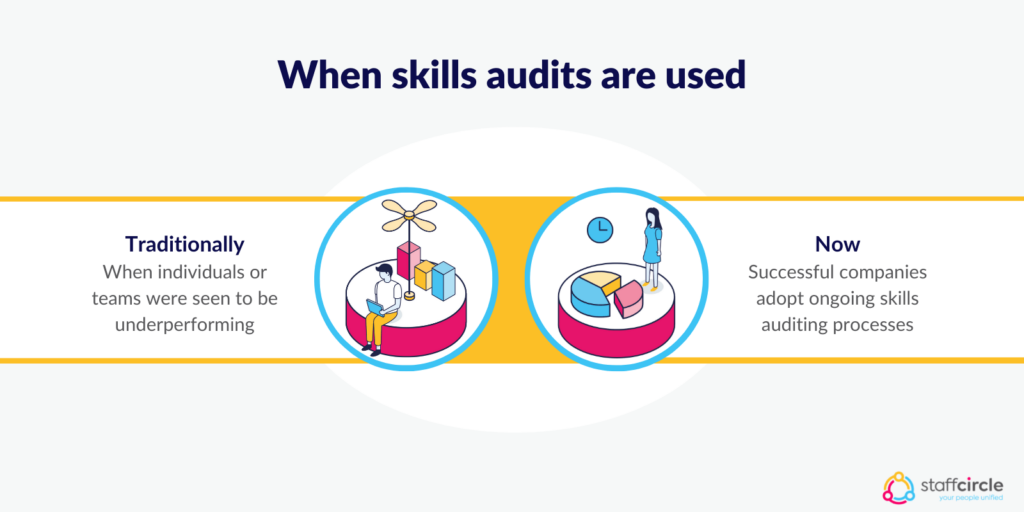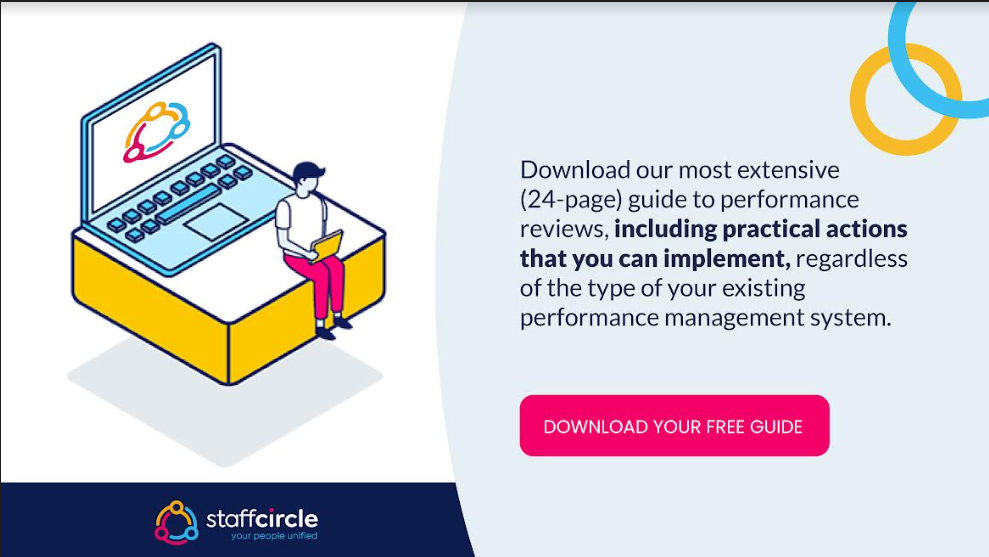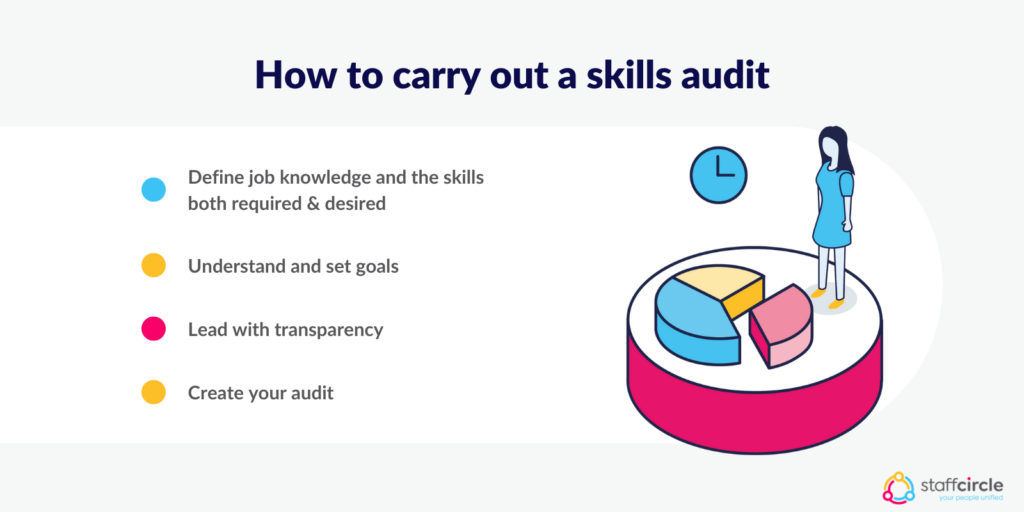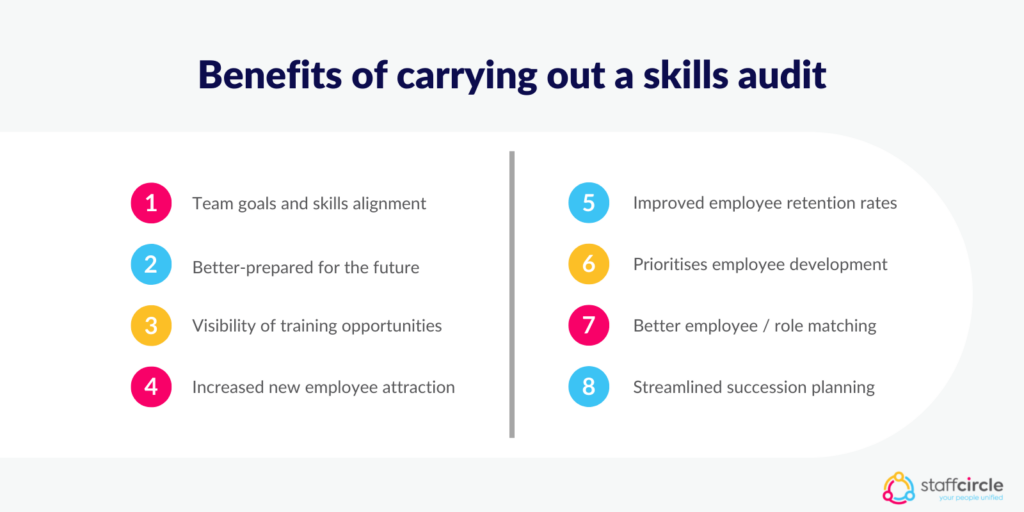What is a skills audit?
A skills audit is the process of analysing the distribution of skills, qualifications, and other work-related abilities of employees at your business. They can be conducted either for individuals or larger groups and are crucial for understanding the training needs of employees.
Companies that use performance management software can keep a detailed record of these skills in their people database. This is updated as employees complete objectives, undergo training or begin a new role. With performance management software, skills are continually tracked at the individual, team, department, and company-wide level.
When are they used?
Traditionally, skills audits were typically used when individuals or teams were seen to be underperforming. This identified the areas of concern so that corrective measures could be put into place.

However, the most successful companies adopt an ongoing process of skills auditing, identifying strengths and weaknesses through continuous conversations with employees. This allows HR leaders and managers to keep on top of any coaching and mentoring, as well as other courses and training staff may require before a skills shortfall causes problems.
What can they do for a business?
By identifying potential gaps in the skills and abilities of employees, skills audits give organisations the chance to train current employees to fill these gaps or onboard new hires capable of delivering results.
The article from the Harvard Business Review, How the Best Managers Identify and Develop Talent, explores the need to view skills as more than simply the qualifications and experience a given employee possesses. The article states:
“The World Economic Forum predicts that 65% of today’s jobs will no longer be around in 15 years … While we may not be able to guess what those jobs will be, it is clear that people will be more equipped to do them if they have certain soft skills, such as emotional intelligence, drive, and learnability.”
By taking this holistic approach to skills and considering a range of soft skills, a comprehensive skills audit can help companies better prepare for all eventualities.
Why is a skills audit needed?
Conducting a skills audit is an important component of a company’s overall approach to performance management and the development of skills. As the requirements of roles evolve as the company’s goals change over time, it’s easy for skills gaps to emerge that need to be addressed.
Development costs related to training needs can then be more effectively budgeted to ensure those individuals that require additional coaching and training can get the resources they need to gain the skills required.

How to carry out a skills audit in 4 steps
Conducting a skills audit is easy. Simply follow these four steps.

- Define job knowledge and the skills both required & desired
The skills and knowledge that are required or desired will vary depending on the job role and employee in question. Defining the required knowledge involves analysing other similar positions to ensure the correct skills are identified, speaking to other people in the relevant team or department to help compile a list of existing skills required. - Understand and set goals based on the organisation.
Once the skills have been identified, it’s time to set goals to help employees achieve them. Make sure these goals are job-related and linked to your organisation’s broader strategy. - Lead with transparency
Transparency and communication are essential for skills development to be effective. Encourage employees who are developing their skills to liaise with their direct reports on a regular basis. - Create your audit
Compiling an overview of existing skills and the skills required in the future is the final step you need to take when conducting a skills audit. These audits can then be saved for future use, for instance when a role is taken over by a new hire or through lateral promotions.
Benefits of carrying out a skills audit
Conducting a skills audit can bring a range of benefits to your company. For example:
The goals and skills of your team will align
Aligning existing skills with team goals is an important aspect of success. When the individuals within a team use their skills in tandem, goals can be more easily achieved.
Your team will be better prepared for the future
Teams that understand what skills are necessary to accomplish goals, and where skills deficits exist within their members, can prepare for the future. Any relevant training and resources they need to perform their roles can be identified and made accessible to those who need them.
Better visibility of patterns and training opportunities
By tracking the company’s collective skills stack, business leaders can recognise emerging patterns. Roles, teams, and departments that more frequently emerge in skills audits as needing upskilling can then be focused on with future training and development opportunities.

Increase employee attraction
Companies that demonstrate an ongoing willingness to help individuals improve their talent stack will act as a magnet to higher-performing job applicants. The A-players seeking to further develop their careers will be more likely to take on a new role if they know their potential new employer is dedicated to their development.
Improve employee engagement and retention rates
The importance of engagement and retention has long been well understood in the business community. Deloitte’s study on engagement and retention observed:
“Engagement is an issue not merely for HR but for the entire executive team. Leading companies work proactively on engagement: They continuously ask themselves why their employees would commit to working at the organization for any length of time and what they can do to make their organization more attractive.”
Skills audits play a central role in this process, identifying areas where individuals can work to improve their talent stack, develop new skills, and work towards their professional goals in alignment with the company’s broader strategy.
Identify and prioritise employee development pathways
A skills audit gives business leaders and HR professionals a clear insight into employees who need development, so they can channel resources accordingly. Whether this is creating a buddy system at work or committing funding for training programs, a skills audit helps prioritise training needs in the right place.
The employees and their roles will be matched
When HR leaders have a clear view of the skills and potential of an individual, they are better prepared to match them with the most suitable role. Much like the recruitment process requires an understanding of where an applicant’s talent lies, so too does a skills audit serve as a continuation of the same understanding.
You can streamline succession planning
Finding the best fit when a crucial member of staff leaves the organisation can be incredibly time-consuming and costly. A skills audit not only breaks down the knowledge and experience necessary for the role, it also helps HR leaders to pick out the best possible candidates from within the company.
Summary
A skills audit is an essential process for business leaders to ensure that training and development programs achieve maximum results. They help to identify what skills are required for a given role, and which employees possess the necessary skills to get the job done.
By incorporating the results of a skills audit in the company’s departmental and organisational chart as an aspect of the people database, business leaders can maintain a consistent birds’ eye view of the collective talent stack.





